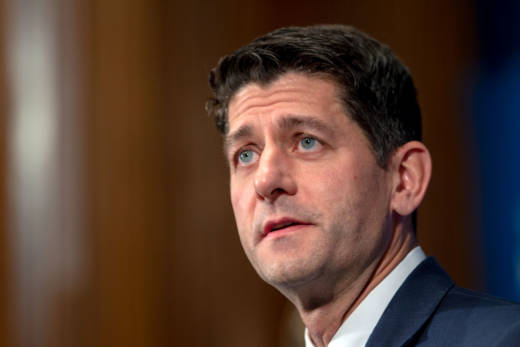House Speaker Paul Ryan pushed back on Tuesday on President Trump's claim that he can strip birthright citizenship from the U.S. via executive order, saying such a move would be "unconstitutional."
"Well, you obviously cannot do that," Ryan told radio station WVLK in Kentucky. "You cannot end birthright citizenship with an executive order."
Ryan noted any changes to a constitutional amendment require an act of Congress, adding: "We didn't like it when Obama tried changing immigration laws via executive action, and obviously as conservatives we believe in the Constitution. ... I'm a believer in following the plain text of the Constitution and I think in this case the 14th Amendment is pretty clear, and that would involve a very, very lengthy constitutional process."
Trump announced his plan to circumvent Congress to revoke the 150-year-old birthright law in an interview with Axios on HBO that is slated to air Sunday.
"It was always told to me that you needed a constitutional amendment. Guess what? You don't," Trump said.
The potential move, which would very likely trigger numerous legal challenges, would seek to end the conferring of citizenship on all children born in the U.S. — which is currently guaranteed by the 14th Amendment — including children of noncitizen parents.
The first sentence of the amendment reads: "All persons born or naturalized in the United States, and subject to the jurisdiction thereof, are citizens of the United States and of the State wherein they reside."
The concept is based on jus soli — "right of the soil" — meaning that children born in the U.S. have a claim to citizenship, even if their parents lack legal documentation to be in the country.
Trump has mentioned the idea of voiding the amendment before, most notably in August 2015, when the birthright issue became part of his hard-line policies on immigration as a presidential candidate. Now Trump is discussing the birthright citizenship law roughly one week before U.S. voters will head to the polls for the 2018 midterm election.
In addition to guaranteeing citizenship by birth in the U.S., the 14th Amendment bars states from denying essential rights without due process. As the Library of Congress notes, the amendment "greatly expanded the protection of civil rights to all Americans and is cited in more litigation than any other amendment."
The amendment's final section notes that it is Congress — not the president — who has the power "to enforce, by appropriate legislation, the provisions of this article."
The 14th Amendment became law in 1868, as a rebuke to the Supreme Court's Dred Scott decision, which had held that freed slaves were not U.S. citizens. Since then, its meaning and reach have been debated in courtrooms and in American society, with many questions centering on the phrase "the jurisdiction thereof."
"That means that they are subject to the laws of the United States, that they can, for example, be prosecuted for violating American law," constitutional law professor Suzanna Sherry told NPR in 2015. The law excludes, for instance, the children of foreign diplomats.
In the 1860s, it was intended both to grant citizenship to freed slaves and to give peace of mind to immigrants.
As Sherry, who teaches at Vanderbilt University, told NPR in 2015, "the United States had experienced quite a bit of immigration, and immigration was viewed as a very good thing. And so this was essentially putting out a welcome mat to immigrants by ensuring that their children born here would be citizens."
To change the law, Sherry said, you would need to either amend the 14th Amendment through Congress or ask the Supreme Court to overturn its earlier interpretation of the law and limit its benefit to people who are in the U.S. legally.
While many legal scholars agree, the president says he has the power to act on his own.
"You can definitely do it with an act of Congress," Trump said in the Axios on HBO interview. "But now they're saying I can do it just with an executive order."
He added, "We're the only country in the world where a person comes in, has a baby, and the baby is essentially a citizen of the United States for 85 years, with all of those benefits. It's ridiculous. It's ridiculous, and it has to end."

9(MDAxOTAwOTE4MDEyMTkxMDAzNjczZDljZA004))